Advanced Certificate in Family Wellness and Crisis Intervention Course Guide
Upskill and improve your career prospects and earning capabilities with The Career Academy. Watch this video and download your free info pack to find out more.
Call Us 24/7 on 1800 837 550
Dive into our rich Psychology & Counselling courses. Learn the fundamentals of psychological theory, or understand how to help people manage their goals, lives & futures.
BECOME
UNSTOPPABLE
Advanced Certificate in Family Wellness and Crisis Intervention Course Guide
Certificate in Child & Adolescent Mental Health
- Introduction
- Understanding Normal Childhood Development
- Good Mental Health
- Understanding Childhood Mental Illness
- Prevalence Of Mental Health Issues In Children And Adolescents
- Differences To Adult Mental Health
- An Introduction To The Mental Health Industry
- Introduction
- Types Of Depression In Childhood
- Diagnosis Of Depression In Children
- Causes Of Childhood Depression
- Assessing Risk Of Suicide
- Introduction
- Scope And Nature Of Anxiety Disorders
- Different Types Of Anxiety Disorders
- Childhood Anxiety Disorders
- Adolescent Anxiety Disorders
- Other Anxiety Related Problems
- Introduction To Tic Disorders
- Types Of Tics
- Gilles De La Tourette Syndrome (Tourette’s Disorder)
- Transient Tic Disorder
- Chronic Tic Disorder
- Tic Disorder (Nos)
- Introduction
- Differences To Adults
- Traumatic Brain Injury
- Congenital Malformations
- Genetic Disorders
- Tumours
- Infectious Diseases
- Cerebrovascular Disease
- Epilepsy
- Environmental Toxins
- Introduction
- Elimination Disorders
- Encopresis
- Enuresis
- Feeding And Eating Disorders Of Childhood
- Reactive Attachment Disorder
- Selective Mutism
- Stereotypic Movement Disorder
- Introduction
- Child Abuse
- Definition Of Child Abuse
- Factitious Disorder By Proxy
- The Effects Of Abuse
- Attachment Issues
- Lifestyle
- Introduction
- Significant Disorders Of Adolescence
- Drug Treatments
- Food And Mental Health
- Alternative Therapies
Certificate in Child Psychological Development
Certificate in Crisis Counselling
Certificate in Family Counselling
STUDENT
REVIEWS
" As soon as I upgraded my CV, I was invited for a job interview and got the job! "
" Following the completion of this course I have been successful in being offered an Administration role which involves some training courses "
" You wanted me to let you know how I got on with any interviews. I got an office admin role!!! So glad to did the course. "
I've never studied online before so I had no idea how this was going to go, but the price of getting a Diploma in Accounting with the Career Academy meant I didn't need a student loan. It was worth the risk.
The Career Academy has given me the opportunity not only to educate myself with accounting software programs but to also receive certification from the software company themselves. It looks amazing on my resume and has opened up so many more job opportunities
Here’s why they chose us:
Over 7,000 Trustpilot ratings with a 4.8 average score
Unlimited Tutor Support
Industry recognised & accredited courses
Online and available
everywhere, anytime
Start from just $25 a week
interest-free
Rolling intake
start anytime
FAQs about our Psychology courses
There are no entry requirements or prerequisites to enrol on this course. You can enrol online directly by clicking “Enrol Now” and following the prompts. Alternatively, you can enrol over the phone with our friendly student advisors – call 1800 837 550 or email info@thecareeracademy.com.au
This course should take approximately 100 study hours. This is only an estimate, and numbers may vary between learners.

